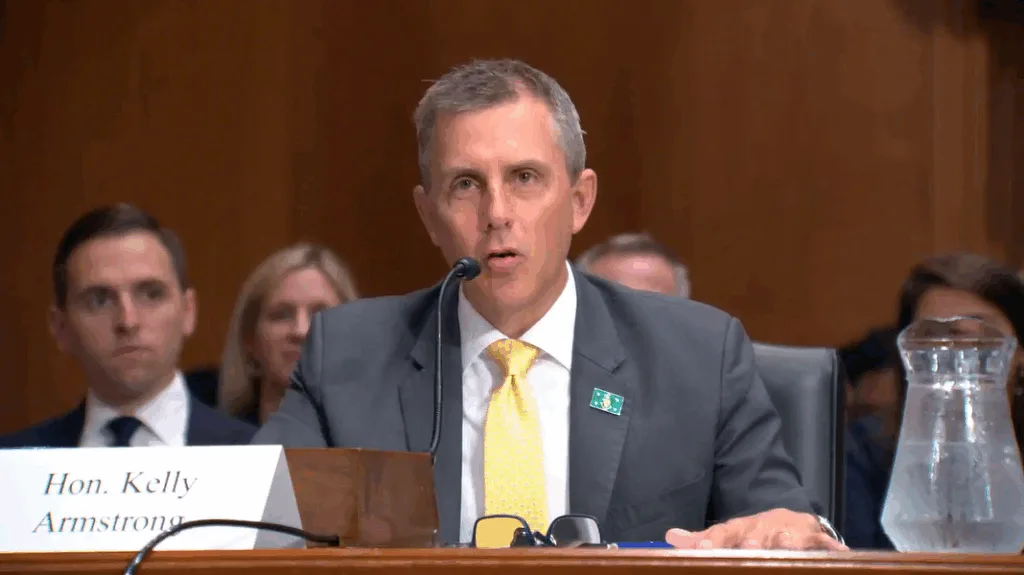

By: Michael Achterling (ND Monitor)
North Dakota Gov. Kelly Armstrong highlighted the need for permitting reform and flexibility for states to administer federal transportation funding during a U.S. Senate committee hearing in Washington, D.C.
Armstrong provided a state’s perspective Wednesday on the Surface Transportation Reauthorization Act, which provides federal funding to states to maintain highways, roads and other transportation projects. The act was funded through the Infrastructure Investment and Jobs Act in 2021, and will expire Sept. 30, 2026.
He told federal lawmakers the roads in North Dakota are not only for the use of local residents but the entire nation as the state provides for the agriculture and energy demands of the country.
“The movement of people and goods from the coasts across North Dakota and other rural states benefits people and businesses at both ends,” Armstrong told members of the Senate Committee on Environment and Public Works.
Armstrong, who testified on behalf of the National Governors Association, said federal grant funding is important, but permitting requirements can be cumbersome and cause delays, increasing project costs.
For example, Armstrong highlighted a $30 million federal grant the North Dakota Department of Transportation received for a rail underpass in Grand Forks. The grant was awarded in June 2023, but the department is still awaiting those dollars two years later, Armstrong said. This year the state Legislature approved $20 million in state funding for the project because of the cost increase associated with the two-year delay, Armstrong said.
“We would take less money from the federal government every single day, if we could get a shovel in the ground faster,” he said.
He added that each state has different needs and environmental concerns when it comes to infrastructure, which means states need more flexibility in administering federal funds.
The panel included Phoenix Mayor Kate Gallego, who said the city recently had 31 straight days with temperatures over 110 degrees. Armstrong added that North Dakota has a shortened construction season with temperatures that can reach as low as 60 below zero.
Sen. Kevin Cramer, R-N.D., a member of the committee, said funding for the highway system is structured around a gas tax that provides funds to make infrastructure improvements, but electric and hybrid vehicles have created unequal participation in that system.
“The pay-to-use system is what our highway system is built on,” Cramer said. He added even combustion engines are using less gas today than years ago.
Armstrong cautioned federal lawmakers against using a miles-driven funding formula because it would disadvantage states like North Dakota and Wyoming that typically require drivers to log more miles based on the distances between population centers.
“If you can deploy the money faster and allow us to do things faster, that’s what I think is the easiest version for adequate funding, because we don’t need as much,” Armstrong said.
North Dakota lawmakers this year considered raising the state gas tax for the first time in 20 years, which supporters said was needed to keep up with the rising cost of road construction projects. The Legislature ultimately rejected increasing the tax.
Sen. Sheldon Whitehouse, D-R.I., ranking member on the committee, raised concerns about recent funds approved by Congress that were paused by President Donald Trump’s administration, such as dollars for education. He said any bipartisan bill requires trust that the funding will be implemented as Congress has directed.
“If we are going to have to continue to live through this selective refusal to release appropriated, obligated funds … that’s a huge deterrent to getting this done,” Whitehouse said.
Armstrong, a Republican and former member of Congress, also attended a White House bill signing Wednesday afternoon. President Trump signed the HALT Fentanyl Act, which will list fentanyl-related substances as Schedule 1 drugs, such as heroin. Armstrong was a co-sponsor of a similar bill that was introduced in Congress in 2022.